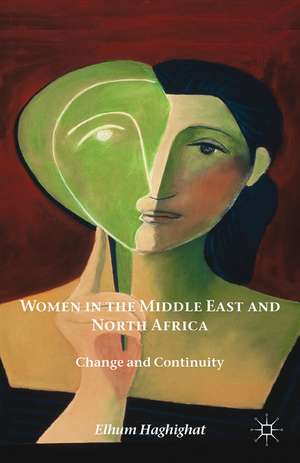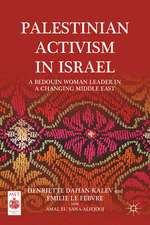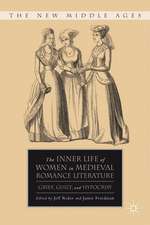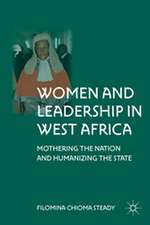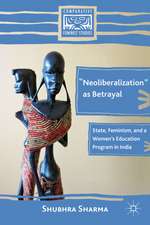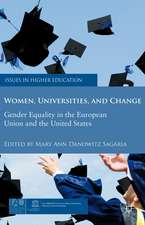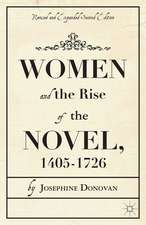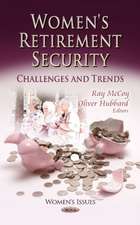Women in the Middle East and North Africa: Change and Continuity
Autor E. Haghighat-Sordellinien Limba Engleză Paperback – 5 sep 2012
| Toate formatele și edițiile | Preț | Express |
|---|---|---|
| Paperback (2) | 381.98 lei 43-57 zile | |
| Palgrave Macmillan US – 18 aug 2010 | 381.98 lei 43-57 zile | |
| Palgrave Macmillan US – 5 sep 2012 | 381.98 lei 43-57 zile | |
| Hardback (1) | 386.81 lei 43-57 zile | |
| Palgrave Macmillan US – 18 aug 2010 | 386.81 lei 43-57 zile |
Preț: 381.98 lei
Nou
Puncte Express: 573
Preț estimativ în valută:
73.11€ • 79.45$ • 61.46£
73.11€ • 79.45$ • 61.46£
Carte tipărită la comandă
Livrare economică 21 aprilie-05 mai
Preluare comenzi: 021 569.72.76
Specificații
ISBN-13: 9781137274106
ISBN-10: 1137274107
Pagini: 216
Ilustrații: XII, 216 p. 1 illus.
Dimensiuni: 140 x 216 x 13 mm
Greutate: 0.27 kg
Ediția:2010
Editura: Palgrave Macmillan US
Colecția Palgrave Macmillan
Locul publicării:New York, United States
ISBN-10: 1137274107
Pagini: 216
Ilustrații: XII, 216 p. 1 illus.
Dimensiuni: 140 x 216 x 13 mm
Greutate: 0.27 kg
Ediția:2010
Editura: Palgrave Macmillan US
Colecția Palgrave Macmillan
Locul publicării:New York, United States
Cuprins
PART I: INTRODUCTION AND BACKGROUND The Path of Social and Economic Change According to the Modernization Theory Patriarchy, Modernization, and the Global Economy PART II: STATUS AND THE COMPONENT VARIABLES THAT INFLUENCE WOMEN'S ADVANCEMENT IN THE MENA REGION Women's Status: The Question of Access to Resources and Women's Empowerment Fertility Patterns, Trends, and Women's Status Education and Status of Women Work: Definition& Patterns Labor Migration, Oil Revenue, and their Impact on Women's Employment PART III: CONCLUSION, DISCUSSION, AND CASE STUDIES
Recenzii
'[This] work dispels common views of the homogeneous impact of religion and culture on women, and it does so through the theoretical lens of sociology. Each chapter enlightens one's understanding of MENA countries Haghighat argues that if Islam were the single greatest predictor of women's social status, their status across MENA countries would be similar, rather than dissimilar. Her empirical work supports her argument that economic and political factors interact with preexisting patterns of Islam to delimit women's social mobility Recommended."
CHOICE
"Women in the Middle East and North Africa explores the status of women by examining the interrelationship of multiple factors such as fertility, education, employment, and labor migration. Haghighat...debunks the popular perceptions through exploring the complex interplay of the patriarchal systems with the Islamic religion and the male-dominated government system...[and] leads the reader to an understanding of women's status in the Middle East...[The book] is an important contribution to the field of women/ Middle Eastern studies by demystifying some of the popular perceptions about the status of women in this region by basing the analysis on a review of empirical evidence... the work leads us to a different and alternative perception, which is a useful tool to help focus on policy and development issues." - Journal of Comparative Social Welfare
"By exploring the interrelationship of the manyfactors that affect Muslim women's social roles, rather than attributing the subjugation of women exclusively to the ideology of Islam, Haghighat seeks to eliminate simplistic and reductionist stereotypes of women in the MENA region and highlight instead the complexity of their socioeconomic conditions." - Middle East Journal
"In this meticulously researched and lucidly written book, Haghighat trounces myths and sets the record straight about the conditions surrounding women in the Middle East and North Africa. She proves that no standard generalization about female subordination or victimization applies to the region.Women emergeas valiant agents shaping their own fateby waging battle against the strictures of patriarchal domination." - Patricia Fernández-Kelly, Princeton University
"Women in the Middle East and North Africa is a solid piece of scholarship. It is theoretically well-grounded, empirically rich, balanced, and thorough in its coverage of the subject matter. At the same time, the book manages to remain accessible throughout. Haghighat writes with the insights of an insider and yet the detached objectivity of an outside observer. I strongly recommend this book to anyone wishing to get a nuanced analysis of women in the Middle East." - Mehran Kamrava, Georgetown University-Qatar and author of Iran's Intellectual Revolution
"Haghighat's work is solid, strong, and a major contribution to the field of women in the Muslim world fromhistorical and socio-cultural perspectives. She combines qualitative and quantitative approaches, a crucial undertaking since much of what is written on women tends to be qualitative and subject to criticisms from those who emphasize quantitative data. Haghighat's work encourages readers to move away from simplistic, stereotypical, and generally negative images of women in the Muslim world by focusing on socio-economic factors rather than ideology (Islam). She challenges those who tend to take a reductionist view of the role of women in Muslim countries." - Roksana Bahramitash, independent scholar and author of Liberation from Liberalization: Gender and Globalization in Southeast Asia
CHOICE
"Women in the Middle East and North Africa explores the status of women by examining the interrelationship of multiple factors such as fertility, education, employment, and labor migration. Haghighat...debunks the popular perceptions through exploring the complex interplay of the patriarchal systems with the Islamic religion and the male-dominated government system...[and] leads the reader to an understanding of women's status in the Middle East...[The book] is an important contribution to the field of women/ Middle Eastern studies by demystifying some of the popular perceptions about the status of women in this region by basing the analysis on a review of empirical evidence... the work leads us to a different and alternative perception, which is a useful tool to help focus on policy and development issues." - Journal of Comparative Social Welfare
"By exploring the interrelationship of the manyfactors that affect Muslim women's social roles, rather than attributing the subjugation of women exclusively to the ideology of Islam, Haghighat seeks to eliminate simplistic and reductionist stereotypes of women in the MENA region and highlight instead the complexity of their socioeconomic conditions." - Middle East Journal
"In this meticulously researched and lucidly written book, Haghighat trounces myths and sets the record straight about the conditions surrounding women in the Middle East and North Africa. She proves that no standard generalization about female subordination or victimization applies to the region.Women emergeas valiant agents shaping their own fateby waging battle against the strictures of patriarchal domination." - Patricia Fernández-Kelly, Princeton University
"Women in the Middle East and North Africa is a solid piece of scholarship. It is theoretically well-grounded, empirically rich, balanced, and thorough in its coverage of the subject matter. At the same time, the book manages to remain accessible throughout. Haghighat writes with the insights of an insider and yet the detached objectivity of an outside observer. I strongly recommend this book to anyone wishing to get a nuanced analysis of women in the Middle East." - Mehran Kamrava, Georgetown University-Qatar and author of Iran's Intellectual Revolution
"Haghighat's work is solid, strong, and a major contribution to the field of women in the Muslim world fromhistorical and socio-cultural perspectives. She combines qualitative and quantitative approaches, a crucial undertaking since much of what is written on women tends to be qualitative and subject to criticisms from those who emphasize quantitative data. Haghighat's work encourages readers to move away from simplistic, stereotypical, and generally negative images of women in the Muslim world by focusing on socio-economic factors rather than ideology (Islam). She challenges those who tend to take a reductionist view of the role of women in Muslim countries." - Roksana Bahramitash, independent scholar and author of Liberation from Liberalization: Gender and Globalization in Southeast Asia
Notă biografică
Elhum Haghighat-Sordellini is an associate professor of Sociology and Political Science and chair of the Political Science Department at Lehman College, The City University of New York.
